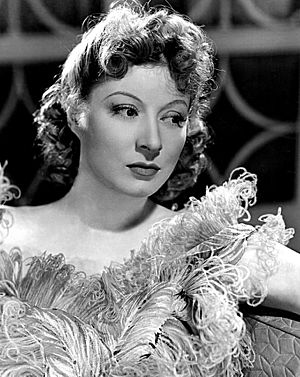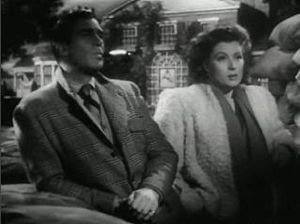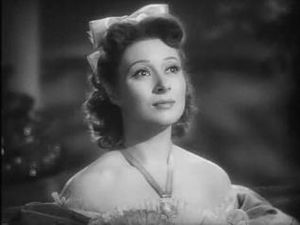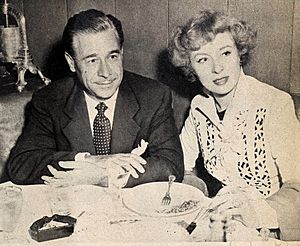Greer Garson facts for kids
Quick facts for kids
Greer Garson
|
|
|---|---|

Publicity photo of Garson c. 1940s
|
|
| Born |
Eileen Evelyn Greer Garson
29 September 1904 |
| Died | 6 April 1996 (aged 91) |
| Resting place | Sparkman-Hillcrest Memorial Park Cemetery |
| Citizenship | United Kingdom (1904–1996) United States (1951–1996) |
| Alma mater | King's College London University of Grenoble |
| Occupation |
|
| Years active | 1932–1986 |
| Political party | Republican |
| Spouse(s) |
|
Eileen Evelyn Greer Garson (born September 29, 1904 – died April 6, 1996) was a famous British-American actress and singer. She was a huge star at Metro-Goldwyn-Mayer (MGM), a major Hollywood movie studio. Greer Garson became very popular during World War II because she often played strong women who kept things going on the home front. From 1942 to 1946, she was one of America's top ten movie stars.
Greer Garson was nominated for the Best Actress Oscar seven times. This is the fourth most nominations for any woman in that category. She even tied a record with Bette Davis by getting five nominations in a row from 1941 to 1945. She won the Oscar for her amazing performance in the 1942 film Mrs. Miniver.
Contents
Early Life and Education
Greer Garson was born on September 29, 1904, in Manor Park, England. She was the only child of Nancy Sophia and George Garson. Her father worked as a clerk in a London importing business. Her mother was from a place called Drumalore in Ireland. The name Greer comes from an older family name, MacGregor.
Greer Garson studied French and 18th-century literature at King's College London. She also did more studies at the University of Grenoble in France. Before becoming an actress, she worked as the head of the research library for a company called Lever Brothers. Her co-worker there, George Sanders, later became a famous actor himself. He said that Greer Garson was the one who suggested he try acting.
Becoming a Star
Greer Garson started her acting career on stage in January 1932, when she was 27 years old. She also appeared on television in the late 1930s, which was very new back then. One of her notable TV roles was in a short version of Shakespeare's play Twelfth Night in 1937. This was one of the first times a Shakespeare play was shown on television.
A famous Hollywood studio head, Louis B. Mayer from MGM, discovered Greer Garson while he was visiting London. He signed her to a contract in late 1937. She had a back injury during her first year and a half at MGM while waiting for the right role.
Her first film was Goodbye, Mr. Chips, which she started filming in late 1938. She received her first Oscar nomination for this role. The next year, she earned great reviews for playing Elizabeth Bennet in the 1940 film Pride and Prejudice.
In 1941, Greer Garson became a major box-office star with the movie Blossoms in the Dust. This film earned her the first of five Oscar nominations in a row for Best Actress. This tied a record set by another famous actress, Bette Davis.
Oscar Wins and Famous Roles
Greer Garson starred in two films in 1942 that were nominated for Academy Awards: Mrs. Miniver and Random Harvest. She won the Oscar for Best Actress for her role in Mrs. Miniver. In this movie, she played a strong British wife and mother protecting her family during World War II.
Her Oscar acceptance speech for Mrs. Miniver was very long, about five and a half minutes! Because of this, the Academy Awards later set a time limit for speeches.

In Random Harvest, she starred with Ronald Colman. This movie was nominated for seven Academy Awards. It is considered one of the greatest love stories of all time and was one of Greer Garson's favorite films.
Greer Garson also received Oscar nominations for her roles in Madame Curie (1943), Mrs. Parkington (1944), and The Valley of Decision (1945). She often acted alongside Walter Pidgeon. They made eight movies together, including Blossoms in the Dust and Mrs. Miniver.
After Clark Gable returned from serving in the war, Greer Garson starred with him in the 1945 film Adventure. The movie's famous slogan was "Gable's back, and Garson's got him!"
In 1946, she injured her back again while filming Desire Me. A large wave knocked her off some rocks. This injury required several surgeries over the years.
Later Career and Life
Greer Garson's popularity slowed down a bit in the late 1940s, but she remained a well-known film star until the mid-1950s. In 1951, she became a citizen of the United States, meaning she had dual citizenship with both the UK and the US. After her contract with MGM ended in 1954, she made only a few more films.
In 1958, she was very well-received on Broadway in the play Auntie Mame. In 1960, Garson received her seventh and final Oscar nomination for playing Eleanor Roosevelt in Sunrise at Campobello.
She also appeared on television shows like Father Knows Best and The Ford Show, Starring Tennessee Ernie Ford. Her last film role was in the 1967 Walt Disney movie The Happiest Millionaire. She narrated the children's TV special The Little Drummer Boy in 1968. Her very last TV role was in an episode of The Love Boat in 1982.
Personal Life and Philanthropy
Greer Garson was married three times. Her first marriage was in 1933 to Edward Alec Abbot Snelson, a British government worker who became a judge. They separated shortly after their honeymoon, and the marriage officially ended in 1943.
Her second marriage was in 1943 to Richard Ney, a young actor who had played her son in Mrs. Miniver. There was a 12-year age difference between them. They divorced in 1947. Richard Ney later became a financial expert.
Her third marriage was in 1949 to E.E. "Buddy" Fogelson, a wealthy Texas oilman and horse breeder. In 1967, they moved to their Forked Lightning Ranch in New Mexico. They were very successful at breeding Thoroughbred horses, including the famous champion Ack Ack. They also had a home in Dallas.
Greer Garson was known for her kindness and for giving money to good causes. She donated millions of dollars to build the Greer Garson Theatre at both the Santa Fe University of Art and Design and Southern Methodist University. She had three special requests for these theaters: the stages should be round, the first play performed should be A Midsummer Night's Dream, and they should have large ladies' rooms!
She was a Republican and was asked to run for Congress in 1966, but she declined. She was also a religious person, following the Presbyterian faith.
Death
Greer Garson spent her final years in a hospital in Dallas. She passed away from heart failure on April 6, 1996, at the age of 91. She is buried next to her husband in the Sparkman-Hillcrest Memorial Park Cemetery in Dallas.
Honours and Awards
In 1991, Southern Methodist University gave Greer Garson an honorary Doctor of Arts degree.
In 1993, Queen Elizabeth II recognized Greer Garson's achievements by making her a Commander of the Order of the British Empire (CBE). This is a special honour from the British government.
Greer Garson also received a star on the Hollywood Walk of Fame on February 8, 1960. You can find it at 1651 Vine Street in Los Angeles, California.
Filmography
| Year | Title | Role | Notes |
|---|---|---|---|
| 1939 | Goodbye, Mr. Chips | Katherine Chipping | Nominated – Academy Award for Best Actress |
| Remember? | Linda Bronson Holland | ||
| 1940 | The Miracle of Sound | Herself | Colour test for Blossoms in the Dust |
| Pride and Prejudice | Elizabeth Bennet | ||
| 1941 | Blossoms in the Dust | Edna Kahly Gladney | Nominated – Academy Award for Best Actress |
| When Ladies Meet | Mrs. Claire Woodruff | ||
| 1942 | Mrs. Miniver | Mrs. Kay Miniver | Academy Award for Best Actress |
| Random Harvest | Paula Ridgeway/Margaret Hansen | ||
| 1943 | The Youngest Profession | Herself – Guest Star | |
| Madame Curie | Marie Curie | Nominated – Academy Award for Best Actress | |
| 1944 | Mrs. Parkington | Susie "Sparrow" Parkington | Nominated – Academy Award for Best Actress |
| 1945 | The Valley of Decision | Mary Rafferty | Nominated – Academy Award for Best Actress |
| Adventure | Emily Sears | ||
| 1947 | Desire Me | Marise Aubert | |
| 1948 | Julia Misbehaves | Julia Packett | |
| 1949 | That Forsyte Woman | Irene Forsyte | |
| 1950 | Screen Actors | Herself | Short subject, uncredited |
| The Miniver Story | Mrs. Kay Miniver | ||
| 1951 | The Law and the Lady | Jane Hoskins | |
| 1953 | Scandal at Scourie | Mrs. Victoria McChesney | |
| Julius Caesar | Calpurnia | ||
| 1954 | Her Twelve Men | Jan Stewart | |
| 1955 | Strange Lady in Town | Dr. Julia Winslow Garth | |
| 1956 | The Little Foxes | Regina Giddens | TV Movie |
| 1960 | Sunrise at Campobello | Eleanor Roosevelt | Golden Globe Award for Best Actress – Motion Picture Drama, National Board of Review Award for Best Actress, Nominated – Academy Award for Best Actress |
| Pepe | Herself | Cameo | |
| Captain Brassbound's Conversion | Lady Cicely Waynflete | TV Movie | |
| 1963 | Invincible Mr. Disraeli | Mary Anne Disraeli | TV Movie |
| 1966 | The Singing Nun | Mother Prioress | |
| 1967 | The Happiest Millionaire | Mrs. Cordelia Biddle | |
| 1968 | The Little Drummer Boy | "Our Story Teller" | Credited as Miss Greer Garson |
| 1974 | Crown Matrimonial | Queen Mary | TV Movie |
| 1976 | The Little Drummer Boy, Book II | "Our Story Teller" | Credited as Miss Greer Garson |
| 1978 | Little Women | Aunt Kathryn March | TV Miniseries |
| 1986 | Directed by William Wyler | Herself | Documentary |
Awards and Nominations
Greer Garson won one Academy Award out of 7 nominations for Best Actress. She also holds the record for the most consecutive nominations, from 1941 to 1945, tied with Bette Davis.
The Academy of Motion Picture Arts and Sciences recognized Greer Garson for these performances:
| Year | Category | Work | Result |
| 1940 | Best Actress | Goodbye, Mr. Chips | Nominated |
| 1942 | Blossoms in the Dust | Nominated | |
| 1943 | Mrs. Miniver | Won | |
| 1944 | Madame Curie | Nominated | |
| 1945 | Mrs. Parkington | Nominated | |
| 1946 | The Valley of Decision | Nominated | |
| 1961 | Sunrise at Campobello | Nominated |
Box Office Ranking
Greer Garson was one of the top movie stars in the United States and the United Kingdom during the 1940s.
| Year | US Rank | UK Rank |
|---|---|---|
| 1942 | 9th | |
| 1943 | 6th | 1st |
| 1944 | 6th | 3rd |
| 1945 | 3rd | 3rd |
| 1946 | 7th | 4th |
Television Appearances
| Year | Title | Role | Notes |
|---|---|---|---|
| 1953 1958 |
What's My Line | Mystery Guest | Airdates: 25 October 1953 6 April 1958 |
| 1955 | Producers' Showcase | Elena Krug | Episode: "Reunion in Vienna" |
| 1956-1960 | General Electric Theater | Various | 3 Episodes |
| 1957 | Telephone Time | Liza Richardson | |
| Father Knows Best | Herself | Episode "Kathy's Big Chance" | |
| 1962 | The DuPont Show of the Week | Juliette Harben | |
| 1965 | The Red Skelton Hour Christmas Special | Herself and "Old Granny" | |
| 1968-1970 | Rowan & Martin's Laugh-In | Guest Performer | 5 Episodes |
| 1970 | The Virginian | Frances B. Finch | |
| 1982 | The Love Boat | Alice Bailey | Episode: "The Tomorrow Lady" |
Radio Appearances
| Year | Program | Episode/source |
|---|---|---|
| 1942 | The Screen Guild Theater | The Philadelphia Story |
| 1945 | The Screen Guild Theater | My Favorite Wife |
| 1946 | Academy Award | Brief Encounter |
| 1946 | Lux Radio Theatre | Mrs. Parkington |
| 1952 | Lux Radio Theatre | The African Queen |
| 1953 | Suspense | Twas the Night Before Christmas |
Images for kids
See also
 In Spanish: Greer Garson para niños
In Spanish: Greer Garson para niños
 | Charles R. Drew |
 | Benjamin Banneker |
 | Jane C. Wright |
 | Roger Arliner Young |




